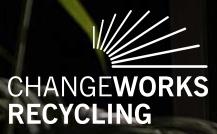 Add My Company
Add My Company
Sign In
Dry Mixed Recycling: The reality
17-01-2020

Dry mixed recycling (DMR) is the established system of recycling collection across the UK. DMR involves placing clean dry recyclables such as paper, cardboard, cans and plastic, into one recycling container, before being picked up and separated at a recycling plant.
Although convenient and extremely common, this system is sadly not the most efficient way to collect recyclables and the reprocessing of the material can be problematic. In this blog, we’ll explain the reality of dry mixed recycling and why, at Changeworks Recycling, we focus on high-quality, single-stream recycling.
Increased costs
DMR might seem an easier recycling option to the consumer, as everything goes into one container. However, this leads to further effort by waste handlers and accompanying costs down the line.
The separation process is costly and labour intensive – often, recyclables have to be separated by hand as machines cannot effectively sort it.
Separate collections are much more cost-effective, eliminating the need for the lengthy separation process and preventing any potential contamination that can result from mixing different recyclables.
Consumer confusion
Another problem with dry mixed recycling is the confusion that surrounds it on a national level – there is currently no coherent guideline on what can and cannot be recycled across the country. Each of the 32 regions in Scotland will accept different items in their DMR collections, which makes it incredibly confusing for households and businesses. Local authorities are also facing tight budget constraints and under pressure for recycling to be as simple as possible for the householder or risk them not recycling at all – having one bin is, therefore, the easiest option for them in terms of cost and convenience.
The burden to get it right is therefore with local authorities and consumers, and this can put many people off recycling altogether. It can also lead to contamination of an otherwise clean recycling load – for example, if someone put an unwashed tin can into a DRM container full of clean paper and cardboard, that could potentially contaminate the entire load and cause it to be instead sent to landfill.
Many people also hold an attitude of ‘we do this at home, so why can’t we do it at work?’ Businesses have to adhere to Scottish regulations that stipulate they must separate their recyclables, so employees are understandably confused when faced with multiple bins.
Businesses can make it easier for employees to get behind single-stream recycling by making it clear what goes in which bin – for example, we have a series of posters that explains this that you can access here.
So, what’s the alternative?
Luckily, dry mixed recycling isn’t the only option for consumers. Separate collection streams and a focus on high-quality recycling are key to ruling out any danger of contamination. At Changeworks Recycling, we treat waste as a valuable resource to promote a circular economy in which recyclables are successfully transformed back into usable products.
We prioritise the key recyclables – glass, metal, plastics, paper, card and food waste – so that our collections are efficient and cost-effective. Single-stream recycling is a simpler alternative to DMR for both user and recycling processor, and with our helpful and clear guides on what to recycle, any chance of confusion is greatly reduced.
Our material is recycled within the UK as it’s high quality, leading to further carbon savings as a result. We offer transparency by not accepting materials we know will be nearly impossible to recycle and end up in landfill anyway. We work with businesses to look at ways they can reduce their business waste and help them achieve additional costs savings.
For more information on Dry Mixed Recycling: The reality talk to Changeworks Recycling
Enquire Now
List your company on FindTheNeedle.

